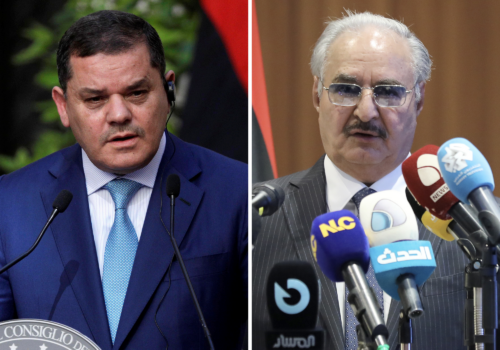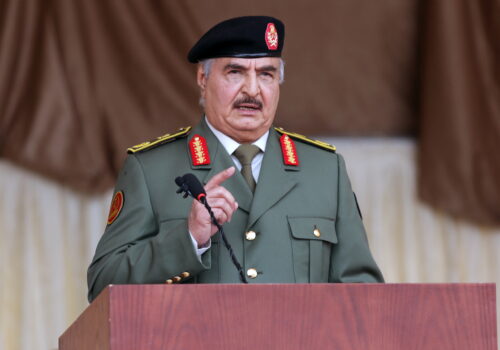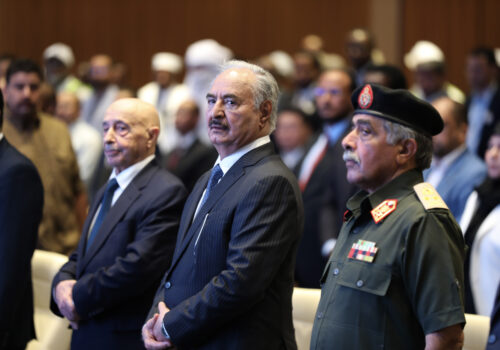Libya’s political deadlock endures. There is a case for Trump and Meloni to challenge the status quo.
Libya’s National Oil Corporation (NOC) announced in January that the country will “soon” hold a public tender for exploring key gas and oil plots, the first such bid since 2007. The upcoming bidding round could allow Libya to stabilize and grow its oil output while attracting foreign direct investments into the country’s energy sector, a vital arm representing about 60 percent of the Libyan GDP, 94 percent of its exports, and 97 percent of the government revenues. Even still, there is room for growth—a majority of Libya’s territorial waters and 70 percent of its land area remain unexplored and are projected to hold vast basins of petroleum and gas reserves.
But the round is set to occur against the backdrop of a decade-old stalemate between the Tripoli-based Government of National Unity (GNU) and Tobruk-based House of Representatives (HoR). Since 2014, the warring factions have failed to agree on a pathway for national elections and a political reconciliation process.
The crisis is one that the US and Italy may be uniquely postured, and incentivized, to quell.
Absent a thawing of that frozen stalemate, Tripoli is unlikely to attract an influx of energy investment. Even more, the stalemate risks plunging Libya into a deeper web of maligned foreign intervention. Both Washington and Rome could leverage their global positions to combat the country’s rabid kleptocracy and facilitate a Libyan-led technocratic political process. The carrot, of course, for this US-Italian stewardship is the opportunity for greater cooperation in countering Russia and China’s growing ambitions in Libya.
Libya’s volatile energy output
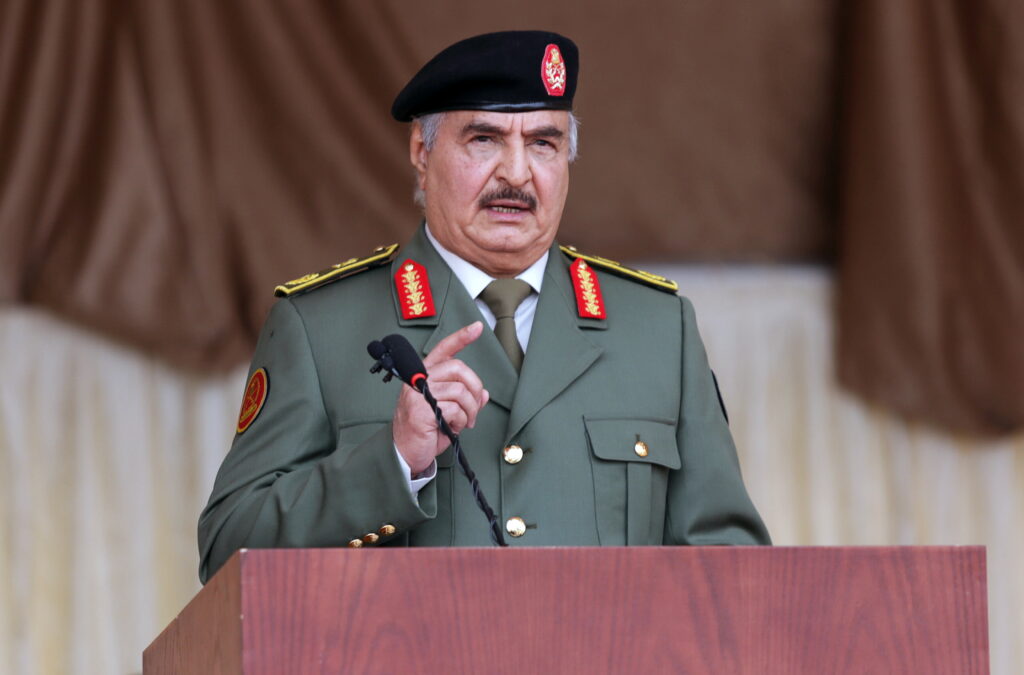
Libyan National Army (LNA) Commander Khalifa Haftar—who is also a US citizen—has held a monopoly over national energy resources for nearly a decade, bringing increased volatility to the country’s oil production. He has demonstrably leveraged his monopoly to negotiate arms deals and grow his access to a foreign support network. A recent Telegraph report uncovered a deal between Haftar and China where the latter reportedly shipped one billion dollars in Wing Loong military drones in exchange for crude oil. Haftar used the arms shipment to further project his power, by using United Nations-affiliated officials to facilitate it, in direct violation of the 2011 UN arms embargo. The move further signaled his rejection of any UN-facilitated process that could threaten his access to power.
As the stalemate stands, there is no guarantee for potential investors that Haftar or his affiliated militias will not force a shutdown of exploration or production. The bidding on the country’s largest petroleum reserves, the Sirte Basin, is largely under the control of Haftar’s LNA. It’s hard to imagine any company winning the exploration rights without buy-in from Haftar’s camp in exchange for security guarantees. Haftar could then leverage the exploration findings—if proven to be promising—to negotiate more favorable drilling approval and production plan contracts, growing his consolidation of the country’s shared institutions as defined by the 2020 ceasefire agreement. This could further open the door for increased foreign intervention in the country as both the GNU and Haftar have continued to leverage existing international partnerships to bolster their grip on the country’s wealthy energy resources.
That includes an increasing closeness with Russia as Moscow pivots from Syria in the aftermath of the ousting of Bashar al-Assad. Such coziness portends that Haftar is likely to seek Russian and Chinese investment in the Libyan energy sector over Europe or the US. Already, in July 2024, Haftar signed a deal with Russian Railways Company to develop a railway connecting Sirte to Benghazi, a route critical to resupplying LNA weapons as well as shipping oil for export. Coupled with his smuggling of Russian oil into Europe, Haftar and Russian President Vladimir Putin demonstrate a keenness to collaborate and circumnavigate existing sanctions on Russian energy resources.
Russia could ensure that its oil continues to be sold while Haftar would bank on Russia’s security backing to negotiate a more favorable role in the country’s future. By working with Russia and China, Haftar is more poised to use the contracts to retain his access to illegal arms shipments in exchange for oil. With little international oversight, he may seek to use the upcoming public tender as an opportunity to gain influence with maligned foreign actors and solidify his grip on power.
Investment opportunities amid growing foreign ambitions
At the end of 2024, the NOC defied global expectations and increased its production to an eleven-year high of 1.422 million barrels per day (BPD). By attracting investment, Libya hopes to repair existing refineries and work with international companies to re-establish its pre-war production output. Libya’s oil minister, Khalifa Abdulsadek, told Reuters in January that the country needs three to four billion dollars in foreign investment to reach a 1.6 million BPD output.
This has already raised some eyebrows among energy investors, and Libya is increasingly considered a hub of investment opportunity with promises of reforms and greater transparency. As Haftar continues to cozy up to China and Russia in search of weapon sales, the GNU has grown closer to Turkey. In 2019, they established an exclusive economic zone between the two countries. The GNU also signed a deal in January with Turkey to grow its cooperation in the renewable energy sector, and has attracted investment interest from Ankara’s state-owned Turkish Petroleum Corporation (TPAO).
SIGN UP FOR THIS WEEK IN THE MIDEAST NEWSLETTER
At the 2025 Libya Energy & Economic Summit held in Tripoli, General Manager of TPAO Ahmet Turkoglu indicated Turkey’s readiness to invest in the country’s energy sector, telling reporters “We are here because we see great potential. I am sure Libya will achieve much more,” specifically referring to offshore fields as part of a 2019 Memorandum of Understanding.
Turkey’s ambitions in the eastern Mediterranean are neither secret nor uncontroversial. Similar to signing its fate with Syria’s Hayat Tahrir al-Sham, Turkey placed its bets on Tripoli’s GNU in hopes of solidifying its ambitions to become a regional hegemon. Paired with Ankara’s growing involvement in facilitating Israel-Hamas negotiations, Turkey’s President Recep Tayyip Erdogan is playing a regional chess game, one that has already proved successful in Syria and in its initial 2020 intervention in Libya. By growing investments in energy projects in Libya, Turkey seeks to gain influence in the country’s economic and political recovery.
Renewing US-Italian engagement in Libya
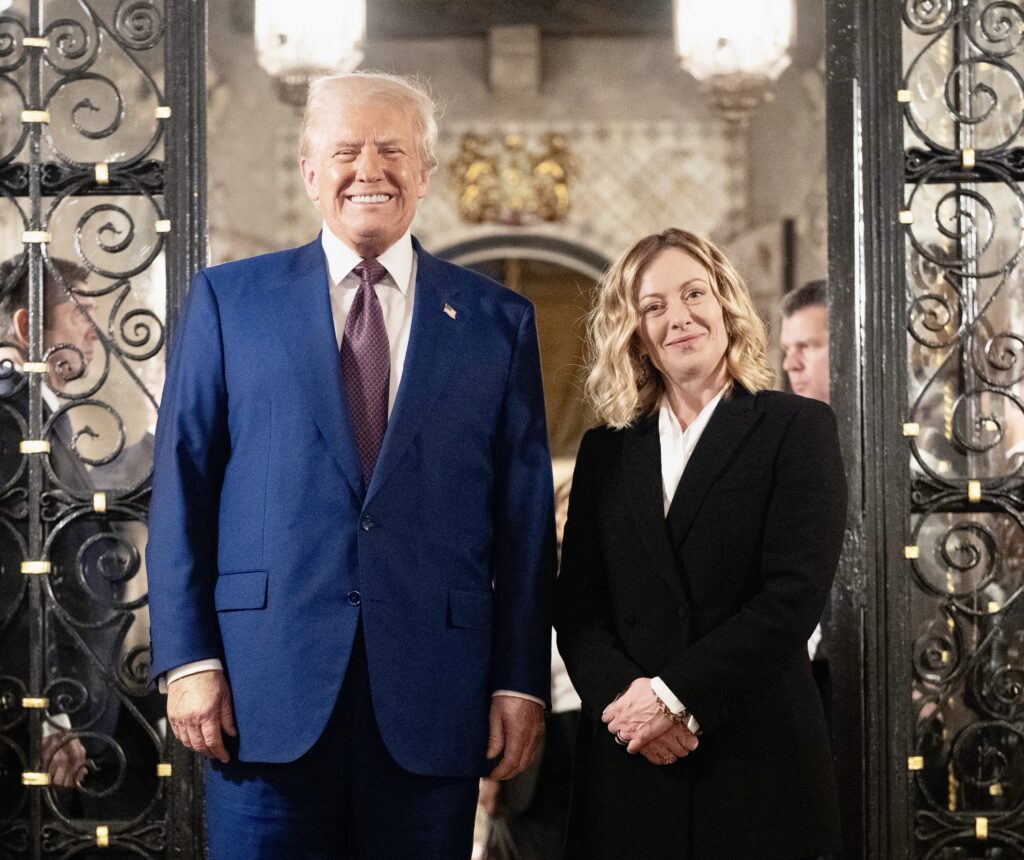
Any international reengagement on Libya short of a clear US role in facilitating an agreement risks plunging the country into a deeper web of maligned foreign intervention and spoiling development potential.
US President Donald Trump, along with his transatlantic ally and personal friend Italian Prime Minister Georgia Meloni, are key international players in Libya. Only their absence and lack of diplomatic engagement allowed Russia and China to expand their operations there. By leading the facilitation of a renewed political process, the US and Italy could benefit from securing exploration contracts for the country’s energy resources, assist Europe in meeting its energy needs, while ensuring that Libyans get the democracy they have wanted since 2011.
Italy is already developing a framework that Trump could assist in—positioning itself to become Europe’s energy hub, helping to facilitate the sale and transport of oil and gas from Africa to the rest of the continent as it pivots from Russian natural resources. Meloni’s “Mattei Plan”, named after Italian oil giant Ente Nazionale Idrocarburi’s (ENI) founder Enrico Mattei, could help Italy achieve its ambitions in becoming Europe’s main energy broker, and Libya could prove to be a helpful provider of the key to that opportunity.
Tripoli’s energy potential remains untapped. It could offer Italy and wider Europe cheaper production rates and a higher quality of “sweet crude” oil compared to its neighbors.
Italy’s investments in Libya have been relatively limited amid concerns about government instability. Rome has pursued energy contracts with other North African energy partners like Tunisia’s ELMED interconnector and Algeria’s Sonatrach. However, ENI has already resumed drilling in areas of the Ghadames basin late last year after a nearly ten-year hiatus, signaling its willingness to invest in Libya’s energy potential. Furthermore, its proximity to Italy could also provide cheaper transport rates, making Libya a highly attractive energy investment partner for Italy.
Meloni knows that without a clear political solution in sight for Libya, there is a significant risk in any investments in the country’s energy sector. Both the HoR and the GNU have failed to achieve their mandate of getting the country to elections, and have lost legitimacy for many Libyans after years of disengagement in determining their country’s future.
The US and Italy could help a new political process by sanctioning Libya’s kleptocrats, who have stalled a solution at the cost of Libyan lives. Their participation and inclusion in any political process should be limited as they risk spoiling the process in exchange for a future role in the country. The US and Italy may instead focus on engaging the country’s civil society and array of economic and political experts in Libya and abroad, to head a transitional process with clearly defined mandates, deadlines, and limitations on power to help get the country towards elections.
This renewed process would have to include negotiations over Haftar’s future role in the country, a subject for which no one has more leverage to bring the military leader to the table than the United States, considering his citizenship there and continued assets in the greater Washington area. Haftar also established a friendly working relationship with President Trump from his first term in office, which could allow the Trump administration an unprecedented opportunity to negotiate on Libya with Haftar’s camp.
There is additional appeal in Libya for Trump, as the country is an important member of the Organization of the Petroleum Exporting Countries (OPEC). Earlier this year, the US president said he would demand that OPEC bring down the cost of oil, blaming high prices on the Russia-Ukraine war.
Tripoli could assist in cutting oil costs by increasing and stabilizing production output. Libya’s acting oil and gas minister, Khalifa Abdulsadek, has already signaled his goal of increasing production from 1.5 million to 2 million BPD by December 2025. Oil production has already recovered and increased in recent months, and by attracting investments, the country’s energy sector could rebound to its pre-2011 output. By diversifying foreign investment in the country away from maligned foreign actors like China and Russia, who have spoiled the peace process in pursuit of their own interests, Libya could ensure investors greater transparency and compliance with international regulations, including the existing arms embargo. However, this cannot be achieved through the current status quo. It’s time for a renewed US-Italian engagement on Libya in search of innovative solutions to its prolonged stalemate.
Trump has already proven he is not afraid to think “out of the box” on foreign affairs during his second term, a posture that could help clinch a deal to end the stalemate. From his attempts in facilitating a ceasefire in Ukraine, to imposing strict tariffs on Canada and Mexico, the US president is interjecting a new strong-armed approach to global issues that could reignite a post-Benghazi attack dormancy on US engagement. Nine years after he used the 2012 terrorist attack as a campaign issue against Hillary Clinton, Trump now has an opportunity to rewrite the fate of Washington’s mission in Libya and bring about a much-needed “win” in the region.
Yaseen Rashed is the assistant director of media and communications at the Atlantic Council’s Rafik Hariri Center & Middle East Programs and a Libya researcher.
Further reading
Fri, Jan 31, 2025
Libya’s de facto partition demands a solution designed for it—not for outside contenders
MENASource By
Libya needs new ideas and a national and international will to reset a realistic path toward a modern state.
Thu, Jan 2, 2025
Russia is making a fragile pivot from Syria to Libya. The West should beware falling into a new trap.
MENASource By Emadeddin Badi
Moscow’s rising influence over the Haftar family’s operations underscores its role as a key arbiter of its survival as a political dynasty. By controlling critical military assets and logistical networks, Russia wields significant leverage over the LNA’s future.
Fri, Sep 20, 2024
The end of Libya’s false stability period
MENASource By Karim Mezran
The international community must act rapidly and effectively to prevent an all-out war between the various Libyan militias and their foreign backers.
Image: A security officer walks past a gas pipeline after an explosion, 18 km (11 miles) south of the city of Ajdabiyah April 3, 2013. Libya is investigating the cause of the explosion late on Tuesday on oil and condensate pipelines to the eastern port of Zueitina, the National Oil Corporation (NOC) said. It quoted acting NOC Chairman Abdulkasir Shengir as saying there were no casualties. REUTERS/Esam Al-Fetori (LIBYA - Tags: BUSINESS ENERGY DISASTER)
